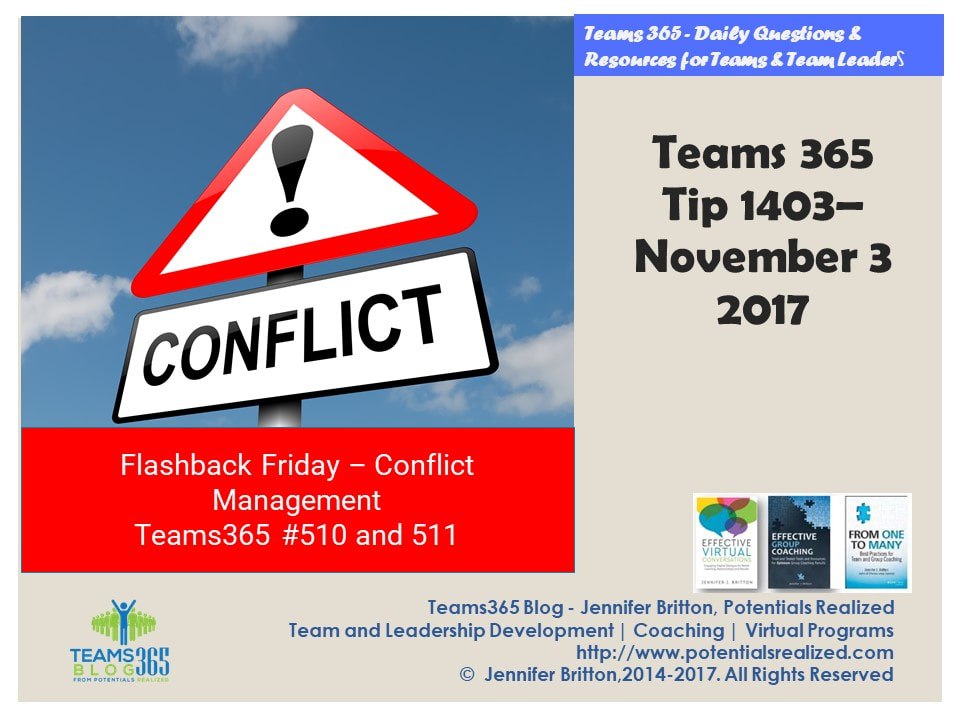In today's #FlashbackFriday's post, I wanted to take us back to two earlier posts I wrote - one on different approaches to conflict (Teams365 #510) and the other on Four Keys to Navigating Conflict (Teams #512).
In approaching different conflicts, there may be several different stances we can take. Many conflict resolution models focus on taking a different stance according to how important the relationship or results is. Here's what I wrote in Teams365 #510:
"Our ability to work through differences and conflict is a key skill for leaders and team members. What we know from research is that complimentary skill sets often make a team strong. In saying this, it may mean that we have different styles which exist, which means that what we value and how we interrelate with the world is different.
What is your natural style in navigating conflict? Different conflict models may have different names for these but we may demonstrate one of many styles including:
Accommodate - often when the relationship is important but the results are not we will accommodate to enable the other party to have their preferred outcome. In accommodation the other party wins, at our loss.
Compromise – Compromise may be important when the outcome is important for both of us, as is the relationship. In compromise, I win some and you win some, but neither party really win.
Avoid – There are instances where it makes sense to avoid conflict and sweep things under the rug. The challenge and danger with this over time is that the issue can fester, and the small minuscule issue can grow into an elephant. Where is may be appropriate to avoid conflict is when the issue is not important and the relationship is not important. IN avoiding I lose and you lose.
Collaboration - Collaboration takes time and may be the preferred solution when relationships and results are both important. Not every situation warrants collaboration, and as Morten Hanson writes in his books, Don’t collaborate just for collaboration’s sake. While collaboration often takes more time, it can be the best outcome. In collaboration I win and you win.
Compete – We may choose to compete to achieve an important outcome when the results are key and the relationship is not as important. When competing we need to be aware of when it becomes too aggressive. In competition I win and you lose
As you consider these five different styles, what are examples of each one and how you and others would benefit from adopting that approach? When might the approach be beneficial?
For those interested in learning about their own style or supporting team members in this area, one interesting online resource I found was Conflict 911.com/resources
Here is what I wrote in Teams365 #511 - Four Keys to Navigating Conflict:
Yesterday I focused on different approaches to conflict – accommodation, compromise, collaboration, avoiding and n completion when faced with conflict, What else is possible? Today's post focuses on four things you can do every day when thinking and working around conflict.
- Be proactive and address conflict early on – While easier said than done, many view navigating conflict as very challenging, in part because issues may have escalated even more than at the start.
- Find the common ground – Finding similar vantage points or even “slivers” where you can see “eye to eye” is a starting point in navigating conflict. These mini-windows are opportunities to open dialogue and mutual problem solving, rather than raising walls.
- Recognize that conflict can be a healthy thing when we have the tools to navigate it. Where cultures do not recognize that conflict is a normal and natural part of human relationships, it may be minimized and swept under the rug, or it can be seen as “abnormal” and “vilified” where something is wrong. What is the culture at your workplace around conflict.
- Invest in your skills in navigating conflict. Conflict management is not always well modelled in our work places and families. If this has been your case it can be useful to invest in some professional development and/or mentoring so you have more phrases and even a model or process to follow. Where is conflict management well modelled? What tools and resources are people using?
Have a great end of the week,
Jennifer
Potentials Realized | Coaching Team Leaders
Team and Leadership Development | Coaching | Retreats.
Follow us on Twitter @Teams365
Phone: (416)996-8326
Looking to enhance your virtual conversations - Conference calls? Webinars? Virtual coaching work? Pick up a copy of my new book, Effective Virtual Conversations, at Amazon.

 RSS Feed
RSS Feed





